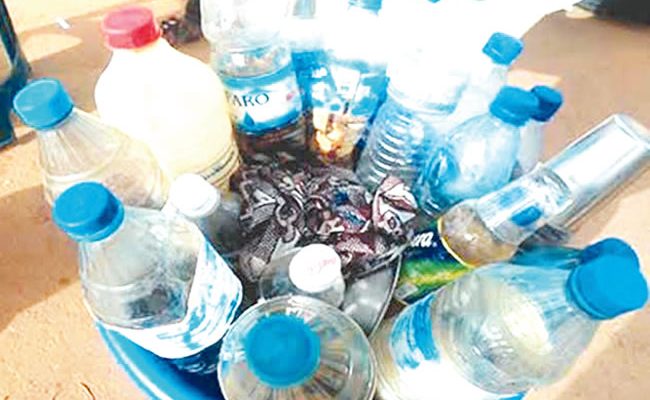

MANY Nigerians, particularly in the Southwest, believe in and use native herbs as medicine. The Yoruba term “agbo” refers to a herbal mixture made from a variety of herbs that have been steeped in water, alcohol, or even palm wine.
‘Agbo jedi’ is a popular herbal remedy among young people, adults, and even the elderly due to its purported ability to heal a wide range of conditions, including impotence, back pain, and haemorrhoids. In addition to the vendors who hawk it on Nigeria’s major and local streets, it is marketed in car parks.

A study said that Agbo jedi (anti-haemorrhoid herbal recipes) accounted for 52.2% of the total herbal medicines that were consumed in Lagos State.
Scenting leaves, cinnamon powder, fresh parsley, grapefruit juice extracts, bitter plants, Sorghum leaves, naphthalene tablets, garlic, Alstonia boonei bark, and dried cloves are among the ingredients of the majority of “Agbo jedi.”
Even though “agbo jedi” is frequently regarded as a safer and more natural substitute for prescription drugs, experts have expressed concerns about the potential adverse effects of using these herbal remedies, particularly when taken for an extended length of time.
Among these worries is the possibility of liver, kidney, and testis harm from prolonged usage of “agbo jedi,” which comprises dried cloves and Alstonia boonei bark. Additionally, its toxic effects on bone marrow impact the production of red blood cells. Additionally, there was a considerable induction of abnormal sperm cells.
Alstonia boonei, popularly known as God’s tree, is ‘Ahun’ in Yoruba, ‘Egbu-ora’ in Igbo, and ‘Ukhu’ in Edo. It is a constituent of herbal concoctions for the treatment of malaria and other ailments such as fever, insomnia, chronic diarrhoea, and rheumatic pains.
Researchers at the Ladoke Akintola University of Technology Faculty of Pure and Applied Sciences had assessed the safety evaluation of an anti-haemorrhoid (pile) herbal recipe (locally called ‘agbo jedi’) of southwestern Nigeria using animal genetic assays.
The 2023 study, which involved Akeem Akinboro, Asiata Ibrahim, Jemilat Muhammed, Hamidah Oloyede, and Rofiat Alimi, was entitled ‘Safety Evaluation of an Anti-haemorrhoid (pile) Herbal Recipe (locally called ‘agbo jedi-jedi’) of Southwestern Nigeria Using Animal Genetic Assays’. It was in the journal Toxicology Advances.
In this study, an anti-haemorrhoid herbal recipe containing the bark of Alstonia boonei and dried cloves was investigated using Swiss albino rats. The rats were administered anti-haemorrhoid herbal recipes at 25.0%, 50.0%, and 100.0%, while distilled water and 0.05% sodium azide were the negative and positive controls, respectively.
Twenty-five mature male rats were administered the anti-haemorrhoid herbal recipe and controls once daily for 35 days. The animals’ weights were determined after every week using a digital electronic balance.
After five weeks, they were sacrificed, and the epididymis was removed and perforated so that sperm cells could swim into a phosphate buffer solution. The testes, liver, and kidneys of the treated rats were also removed for testing.
The anti-haemorrhoid herbal recipe at a high dose induced damage in the body cells, and the percent of abnormal sperm cells induced by the anti-haemorrhoid herbal recipe was non-dose dependent, having recorded a higher percent of abnormal sperm cells at 25.0% than that at 50.0% dose. However, the highest percent of abnormal sperm cells was obtained at 100.0%.
According to them, “In the present study, the effects of the anti-haemorrhoid herbal recipe on the testes, liver, and kidney were different from the effect of the aqueous extract of Alstonia boonei, which was reported to damage the testicular and kidney tissues of experimental animals.
“The induction of significantly different micronuclei and abnormal sperm cells at 100.0% than the negative control indicates that the anti-haemorrhoid herbal recipe was toxic and should not be consumed at a high concentration because of its potential to cause mutations in dividing cells.
“These results necessitate regulation and control of consumption of this anti-haemorrhoid herbal recipe by people through the authorised government agencies in Nigeria.”
The researchers suggested that the chemical substances in Alstonia boonei and cloves might have acted synergistically to produce the observed toxic effects in this study, therefore making the toxicity tests for medicinal herbal preparations also important.
Furthermore, just because some of the substances used to make “Agbo jedi” are natural doesn’t mean that they are safe to use. Heavy metals like arsenic, lead, and mercury are present in several of the herbal mixture’s constituents and can have major negative effects on health if ingested over time.
Many herbal mixtures contain ingredients that, if consumed in excess or over an extended period, can cause serious health problems, including organ failure and even death, particularly when there are more potent remedies like antibiotics. It doesn’t replace conventional medicine.
The biggest risk associated with herbal concoctions is that the National Agency for Food, Drug Administration, and Control does not regulate them. There is no standardisation of the ingredients used in these products, and the quality and safety of the herbs and other ingredients can vary.
Read Also: FBN Holdings set to exceed recapitalisation requirement








